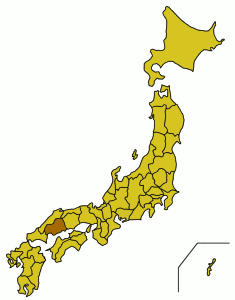
Hiroshima Prefecture (広島県 Hiroshima-ken) is in the western Chugoku region of the main Japanese island Honshu.
Understand
[edit]This location has been a major center of trade since the beginning of Japan's recorded history. Having 2.8 million people, Hiroshima is ranked as the 12th most populated prefecture among the 47 prefectures of Japan.
Climate varies between places within the prefecture and between seasons; southern coastline areas are generally warm and don't get much rain throughout the year, while northern mountains can get heavy snow in winter. In summer, the temperature is around 26 degrees Celsius on average, and can go beyond 35 degrees.
Tourist Information Site
[edit]Dive! Hiroshima is the prefecture's official multilingual guide site.
Cities
[edit]Other destinations
[edit]
Get in
[edit]By plane
[edit]1 Hiroshima Airport (HIJ IATA). Fields a fairly good selection of domestic flights as well as some from Seoul, Bangkok and various points in China. Flight time from Tokyo, the busiest route, is around 90 minutes.
By train
[edit]The Sanyo Shinkansen from Osaka to Fukuoka (Hakata) runs down the coast of Hiroshima prefecture, stopping at all major cities including Hiroshima and Onomichi. Direct Nozomi trains from Tokyo take about four hours to reach Hiroshima and cost ¥18,500 one-way.
By bus
[edit]Get around
[edit]By train
[edit]By bus
[edit]By car
[edit]By bike
[edit]Some coastline areas in Hiroshima are good for travelling by bike. Setouchi Shimanami Kaido Cycling Course, connecting Onomichi, islands on Seto Inland Sea and Imabari, is a major attraction to cyclists around Japan.
See
[edit]
- View the remnants of the devastation left by the atomic bomb at the Atomic Bomb Memorial Museum and Peace Park (Hiroshima)
- Take a ferry to Itsukushima Shrine the most photographed Shinto Shrine and World Heritage Site (Miyajima)
- Try the local sake and roam the historic streets of Saijo (Higashihiroshima)
- See the "best view in Asia" firsthand in Tomonoura (Fukuyama)
- Tour the facilities of the famous Japanese car-maker at the Mazda Museum (Hiroshima)
- Enjoy the seasonal flowers at Sera Kogen (Sera)
Do
[edit]- Shimanami Kaido - A 70km cycling route from mainland Hiroshima to Shikoku via multiple islands in the Seto Inland Sea.
Higashi-Hiroshima City
[edit]- Saijo Sake Festival in October.
- Visit a sake brewery.
Eat
[edit]
- Okonomiyaki (お好み焼き).
- Oysters (牡蠣 kaki).
Drink
[edit]Go next
[edit]- Okayama Prefecture lies to the east. Kurashiki with its beautiful and well-preserved historic district is easily accessible from Hiroshima Prefecture. Other cities in the prefecture include Okayama, which contains many museums, Korakuen Garden one of Japan's Top 3 gardens, and the Kibi Trail, among other things. The city of Takahashi is home to the famous Bitchu Matsuyama Castle, which is the highest castle in Japan, as well as one of Japan's remaining original castles.
- Shimane Prefecture is located north of Hiroshima Prefecture. In Izumo you can find Izumo Shrine, the second most holy Shinto Shrine in the nation; it's quite an impressive site. The city of Matsue is famous for Matsue Castle, one of only twelve original castles left in Japan, Vogel Park, one of the largest greenhouses in the world, and the Lafcadio Hearn Residence. Shimane is also home to one of UNESCO's World Heritage Sites, Iwami Ginzan, in Oda.
- Yamaguchi (prefecture) borders Hiroshima Prefecture to the west. In the city of Yamaguchi, you will find the beautiful Rurikoji Temple, Joieiji Temple, and memorial for Saint Francis Xavier. In Hagi, there are many cultural sites, such as the ruins of Hagi Castle, Hagi Castle Town, and the Hagi Uragami Museum which houses a large amount of famous Japanese Ukiyoe artwork. For nature lovers, Akiyoshidai is home to Akiyoshidai Plateau, the largest limestone plateau in Japan and the Akiyoshido Cave, the largest cave in Japan. Akiyoshidai is not so well known among foreign tourists however, it is a unique and very worthwhile addition to one's travel itinerary.


